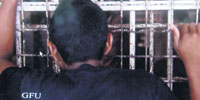
| Caged children They are punished for petty crimes…and an outdated system fails to recognize social and psychological issues An 18- year-old girl was brought to the Ranmuthugala certified school when she was 12. Six years later, she remains there, unable to return home as her case is still pending in court. A boy in the Makola certified school tells of how he feels caged and of his desperate need to go back to his mother and his school. Then comes the story of another child in the Hikkaduwa certified school of how he came to be there: how after his father took his own life, he had no way to survive and thus went to pluck five coconuts to fill his belly for which crime he ended up in this home. *********************************************************************************************** The shocking plight of children in state-run homes and institutions was revealed recently in 'Dangagei Daruwo' (Children in Prison), a documentary done for the Government Film Unit of the Department of Information by young film-maker Kavimal Sooriyarachchi.
"I set out with the idea of doing a documentary on the impact on children from broken homes where mothers are forced to seek employment abroad as domestic aides. But as my study progressed, I realized that I had found a bigger and more pressing issue that needed to be addressed, that of children in remand homes and certified schools, and their pathetic plight," said Kavimal, a student of award-winning film director Vasantha Obeysekere. There are two main categories of children's homes in the country - the voluntary homes numbering around 200 and the state-run homes which are further divided into remand homes, certified schools, state-receiving homes, detention homes and approved schools. The two groups of children in these homes are those who have been in trouble with the law, that is, child delinquents and offenders and the other, the children who are neglected, homeless or abused. The documentary spotlighted many disturbing issues: how due to lack of space, children who are kept there for their own protection and those who are serving a sentence after being convicted, have to cohabitat. Harshana Nanayakkara, UNICEF's former legal advisor who has worked in the fields of child protection and welfare for many years, helped in the making of the film. The idea of the documentary was not to point fingers at anyone, but to constructively bring to light issues that need to be addressed in a manner that will eventually serve and help the children, he said. "Government officials are underpaid and overworked. They have limited resources. All this contributes to their very low morale in carrying out their duty. Needless to say, the children are the victims," Mr. Nanayakkara said. A case is rarely, if ever, found where a child has stolen anything worth more than Rs. 10,000 or committed grave offences like murder or rape, Mr. Nanayakkara pointed out. "The delay in filing the Social Inquiry Reports by some officers results in children having to spend 4-5 months in such homes. In the absence of this report, the magistrate will not be able to give a verdict and the child will then have to make more than two or three visits to the court," he said. Some police officers delay the completion of filing charges, and the children are detained further. Another serious deficiency is the dearth of legal officers in Probation Departments. Preventing children from going into remand homes should be looked at seriously in the first place, Mr. Nanayakkara said. Possible alternatives include the police releasing young offenders by entering into a bond and handing them back to parents/guardians. Alternatively the Government can take steps to set up a database of 'fit persons' who can be entrusted with the child offenders rather than sending them to such homes. Since the majority of the cases are for minor thefts, Mr. Nanayakkara suggests that the Mediation Board should look at the possibility of including theft under its ambit which would prevent children from being exposed to court rooms and remand homes. When children are taken to court, they are exposed to more serious crimes like rape and drug abuse. "In my opinion, none of these children needs to be in a remand home, but they are there because they have no one to speak for them. Once they get released from these homes, they come out angry and frustrated. They cease to respect authority and grow up with frustration and this would result in disastrous consequences on the long run," Mr. Nanayakkara said. "Even though food, clothes and some kind of education are provided, the psychological and mental development of the child can never be addressed in such homes. “Being held captive, devoid of a healthy family environment, is very sad. The aim should be to do away with such homes and explore other options, rather than focusing on improving them," Mr. Nanayakkara said. The Sunday Times learns that the awareness raised by the documentary has already brought some response. According to Mr. Nanayakkara, many lawyers have begun to offer voluntary legal services and some have even visited the homes. Sarath Abayagunawardena, Commissioner of the Department of Probation and Child Care, says the major shortcomings of the current system are lack of staff, insufficient infrastructure facilities and inadequate and unsatisfactory training for staff on how to deal with the children's psychological development . He said his department would welcome the appointment of legal officers. "UNICEF appointed a legal officer on contract, but after the contract expired we are without any legal officers. We need at least one legal officer for each provincial department. In such a case, the whole process can be expedited," he said.
|
|| Front
Page | News | Editorial | Columns | Sports | Plus | Financial
Times | International | Mirror | TV
Times | Funday
Times | MediScene || |
| |
Copyright
2006 Wijeya
Newspapers Ltd.Colombo. Sri Lanka. |
